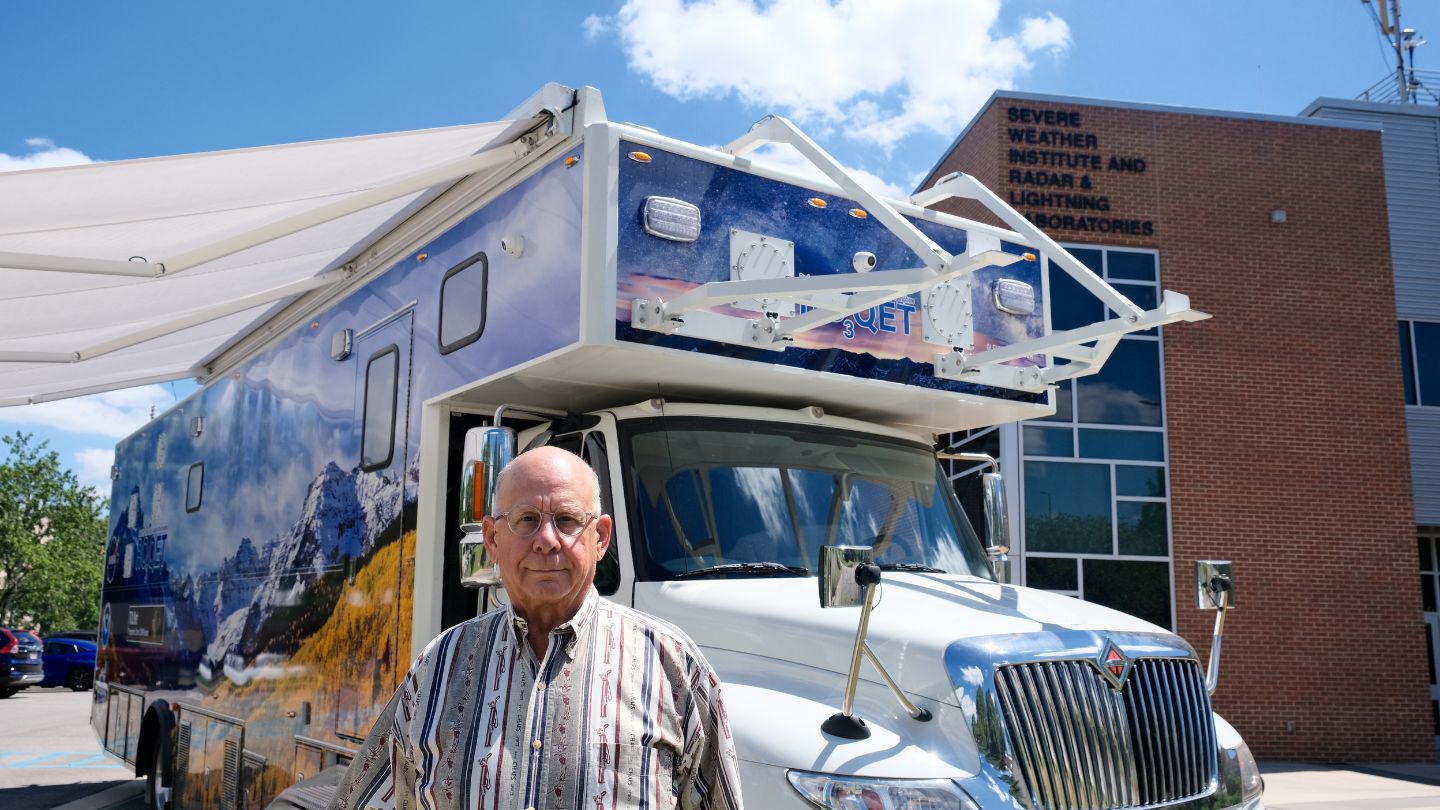
Dr. Michael Newchurch outside the UAH SWIRLL Building with his instrument truck the Rocket-city Ozone (O3) Quality Evaluation in the Troposphere (RO3QET)
Prof. Michael Newchurch, faculty in the Department of Atmospheric and Earth Science and a principal investigator in the Earth System Science Center at The University of Alabama in Huntsville (UAH), received the NASA Exceptional Public Service Medal on April 24, 2024. Since joining UAH in 1988 as a researcher, Prof. Newchurch’s groundbreaking work on air quality and the chemistry of air pollutants has made significant contributions to atmospheric science.
In the early 1990s, Prof. Newchurch played a crucial role during the NASA ATLAS Space Shuttle mission, with experiments on board advancing the understanding of stratospheric chemistry, particularly in predicting ozone recovery. Using multiple observations for space-borne, ground-based, and air-borne platforms, Newchurch and colleagues published the first evidence for the first stage of stratospheric ozone recovery in a tetralogy of papers in the 2000s confirming the success of the most significant environmental program of the last century, the Montreal Protocol, a worldwide that minimized the production and use of ozone-depleting substances.
In addition, Prof. Newchurch's work has advanced lidar technology for atmospheric measurements, particularly in the study of tropospheric ozone and aerosols. He helped establish the NASA Tropospheric Ozone Lidar Network (TOLNet), a collaborative effort spanning multiple research institutions, NASA centers, Canada, and the NOAA Boulder Lab. TOLNet operates as a surface-based measurement network, providing essential vertical ozone
profiles critical for air quality studies. It has also established international standards for measuring tropospheric ozone profiles, which are crucial for comprehending air quality dynamics and their implications for human health.
He has advanced global environmental monitoring, collaborating with international partners like Yonsei University in South Korea to develop the South Korean GEMS geostationary air-quality satellite mission (launched in 2020). He also made key contributions to the NASA TEMPO geostationary air-quality mission (launched in 2023) helping to develop the scientific proposal objectives and validation strategy, and initiating the Early Adopters program. The TOLNet ground-based program is an intrinsic adjunct to the space-borne NASA TEMPO mission for validation and synergistic measurements.
In addition to his scientific accomplishments, Prof. Newchurch has been a mentor and collaborator throughout his career, emphasizing teamwork and recognizing the contributions of his colleagues and the 39 undergraduates and 19 graduate students he has guided. His leadership has nurtured scientific talent through initiatives like the NASA TEMPO Early Adopters program, now led by Dr. Aaron Naeger from the Marshall Space Flight Center, formerly a Research Scientist at UAH. The program engages about 650 participants, initially using synthetic data and recently incorporating live NASA TEMPO measurements to help users become familiar with and utilize the new data effectively.
Prof. Newchurch received the NASA Exceptional Public Service Medal for his extensive experience and contributions to atmospheric science, particularly his leadership in NASA-funded projects such as the TOLNet and his dedication to engaging the air-quality community. His role in developing TOLNet emphasizes his commitment to integrating data from multiple observing vantage points—a hallmark of NASA's Earth Science Division (ESD). Reflecting on the honor, he states, "The medal I received is much more about all my students and collaborators. It's not about me."